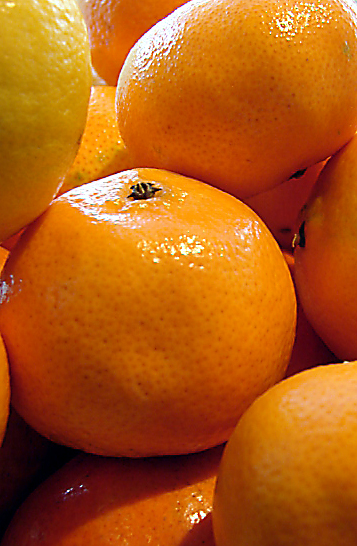Nov. 13, 2011: 33rd Sunday in Ordinary (A)
 Earlier this week, I visited a priest friend in Breaux Bridge who graduated from the seminary with me. He spends his off-days with his parents who are retired. They have a very simple life and routine. We each sit in our own Lazyboy chair near a TV and talk about what has been going on as we watch Price Is Right, The Bold and the Beautiful, and The Talk. When Dr. Phil comes on, I say goodbye and drive back to town. On this occasion, my friend’s dad invited me out to his yard to give me Satsumas that were hanging on the trees. He has about nine Satsuma trees, each with branches hanging heavy with fruit. He said to me, “The other day a man drove up and said, ‘I see that you have Satsumas.’ I was going to give him some, and then he asked, ‘Are they sweet?’ I thought to myself, ‘Boy you are a particular fellow,’ so I answered him, ‘No, they’re not sweet.’ Then, he didn’t want any.” My friend’s dad continued to nip the fruits from the trees and place them in my Walmart bag. He went on to say, “I don’t keep these satsumas for me. I give most of them away. I visit my hunting buddy in the nursing home regularly, and I try to bring him something small, like satsumas, each time I go. That’s how our life should be, giving small things to someone each day. Now, Paul, you come back when it’s colder. Satsumas are sweeter when it’s colder.”
Earlier this week, I visited a priest friend in Breaux Bridge who graduated from the seminary with me. He spends his off-days with his parents who are retired. They have a very simple life and routine. We each sit in our own Lazyboy chair near a TV and talk about what has been going on as we watch Price Is Right, The Bold and the Beautiful, and The Talk. When Dr. Phil comes on, I say goodbye and drive back to town. On this occasion, my friend’s dad invited me out to his yard to give me Satsumas that were hanging on the trees. He has about nine Satsuma trees, each with branches hanging heavy with fruit. He said to me, “The other day a man drove up and said, ‘I see that you have Satsumas.’ I was going to give him some, and then he asked, ‘Are they sweet?’ I thought to myself, ‘Boy you are a particular fellow,’ so I answered him, ‘No, they’re not sweet.’ Then, he didn’t want any.” My friend’s dad continued to nip the fruits from the trees and place them in my Walmart bag. He went on to say, “I don’t keep these satsumas for me. I give most of them away. I visit my hunting buddy in the nursing home regularly, and I try to bring him something small, like satsumas, each time I go. That’s how our life should be, giving small things to someone each day. Now, Paul, you come back when it’s colder. Satsumas are sweeter when it’s colder.”As I drove back to Donaldsonville, I thought about what this kind man had told me regarding the fellow who wanted only sweet satsumas. As the saying goes, ‘Beggars can’t be choosers.’ Meaning, if someone gives you something you asked for, you should not complain about what you get. We all have learned through life that not everything that comes our way as “gift” is sweet and pleasant. At times, the ‘gift’ is more bitter than sweet. Even the body that God has given us, the children that God has given us to raise, or the job that God has entrusted to us can give us bitter experiences. I imagine, though, that all of us have experienced what my friend’s dad wisely said, “Satsumas are sweeter when it’s colder.” Yes, even harsh, difficult struggles can create something good in our life. We may not know it while we are in the middle of the difficult time, but we often realize the benefit or blessing much later.
In today’s Gospel parable, Our Lord shows us a man who entrusts his possessions to his three servants, each according to what he thought they could manage. Unlike the two servants who used their gifts to multiply the talents, the third servant, out of fear, buried the talent given to him. The servant assumed that his master was a demanding and harsh person so he did not want to lose his master’s money. His master scolds the third servant for that attitude. Was the master truly a demanding and harsh person? He must not have been, otherwise the other two servants would have had the same attitude. The third servant did not know or love his master, for the love would have cast out his fears.
We may have a similar reaction in our relationship with our Heavenly Father. If we do not know how generous, merciful, and compassionate Heavenly Father is, then we become like that third servant, unable or fearful to be faithful in even the small things entrusted to us. When we love the Father, we trust that what He asks us to do today will reap sweet fruits. The fruit may not ripen as quickly as we want, so we have to call upon the virtue of patience while the fruit progresses. The fruit may be bitter at the beginning, but if we wait patiently through the cold weather, we will taste the sweetness that Our Father has promised us.


